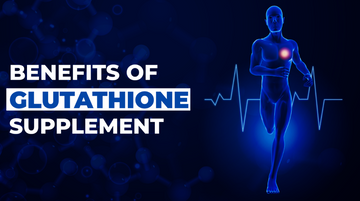

The Health Benefits of Glutathione: A Complete Guide
Table of Contents
Glutathione is a powerful antioxidant that plays an essential role in maintaining good health. It is often referred to as the "master antioxidant" because it helps protect our cells from damage caused by free radicals and toxins.
In this blog, we will dive deep into the world of glutathione, understand its significance in staying healthy and unveil the numerous health benefits it offers. From combating oxidative stress to boosting fertility, we cover it all. We also discuss ways you can increase your glutathione levels through diet and lifestyle changes and examine the safety and potential side effects of taking glutathione supplements.
So if you're looking to take control of your health, read on to discover how this vital antioxidant can help you do just that!
What is Glutathione?
Glutathione, a potent antioxidant, is essential for maintaining overall health. Acting as a natural detoxifier, it safeguards cells from oxidative damage. While the body produces glutathione naturally, levels may decline due to aging, poor nutrition, or certain health conditions.
Glutathione synthesis relies on amino acids like glutamic acid, cysteine, and glycine. Various factors, including oxidative stress and immune function, can also influence glutathione levels. By incorporating these building blocks, glutathione enhances the body's ability to combat oxidative stress and bolster lung function.
Studies have shown that lower levels of glutathione are associated with conditions such as Parkinson's disease and ulcerative colitis. On the other hand, higher glutathione levels have been linked to improved health outcomes. A pilot study exploring the efficacy of glutathione in drug administration demonstrated promising results.
Top Health Benefits of Glutathione
Combatting Oxidative Stress:
One way to combat oxidative stress is by harnessing the power of glutathione, a potent antioxidant . Glutathione works by neutralizing free radicals, thus reducing the levels of oxidative stress in the body. By maintaining adequate levels of glutathione, you can help prevent cell damage and maintain overall health and well-being.
In conditions associated with high levels of oxidative stress, such as rheumatoid arthritis or heart disease, glutathione supplementation may be beneficial. Its antioxidant properties protect against oxidative damage, promoting healthy aging. Additionally, incorporating food sources rich in glutathione, like cruciferous vegetables, into your diet can contribute to lower levels of oxidative stress.
Enhancing Immunity
Glutathione plays a vital role in supporting the immune system, aiding the body in defending against infections and diseases. It helps regulate immune cell function, promoting a balanced immune response. Low levels of glutathione can impair immune function, increasing the risk of infections and autoimmune diseases. However, by boosting glutathione levels through supplementation or lifestyle changes, it's possible to enhance immune system function.
Potential Role in Improving Brain Health
Glutathione has demonstrated promising potential in enhancing brain health, which could have positive implications for neurodegenerative conditions. Research suggests that higher levels of glutathione are associated with better cognitive function and neuroprotection.
One way glutathione benefits the brain is through its antioxidant properties, which help reduce oxidative stress—a contributing factor to neurodegenerative diseases. While glutathione supplementation may support brain health, more research is needed to determine its efficacy.
Influence on Insulin Resistance
Optimizing glutathione levels may have positive effects on blood sugar control and metabolic function. Low levels of glutathione have been linked to insulin resistance, a precursor to conditions like diabetes and metabolic syndrome. Glutathione supplementation, in conjunction with lifestyle changes, could potentially improve insulin sensitivity.
Additionally, the antioxidant properties of glutathione can help lower oxidative stress, which is a contributing factor to insulin resistance. By addressing low glutathione levels, individuals may have a better chance of maintaining proper blood sugar regulation and overall metabolic health.

Contribution to Liver Health
Glutathione plays a vital role in maintaining liver health by supporting the detoxification process and safeguarding liver cells. Adequate levels of glutathione are essential for optimal liver function as it helps in the removal of harmful substances from the body. Low levels of glutathione have been associated with liver conditions such as fatty liver disease.
Possible Help with Inflammatory Bowel Disease
Glutathione supplementation may potentially support the management of inflammatory bowel disease (IBD). Studies suggest that individuals with IBD may have lower levels of glutathione, which is a vital antioxidant in the body. By increasing glutathione levels, it is believed that oxidative stress in the gut could be reduced, potentially alleviating symptoms of IBD.
Reduction of Heart Disease Risk
Glutathione's antioxidant properties have been linked to a potential reduction in heart disease risk. The ability of glutathione to lower oxidative damage and inflammation may play a role in protecting the cardiovascular system. Additionally, higher levels of glutathione could contribute to improved blood flow and regulation of blood pressure, both of which are important factors in maintaining heart health.
Prevention of Obesity
Individuals with obesity may have lower levels of glutathione, a powerful antioxidant. Supplementing with glutathione could potentially support weight loss efforts by aiding in metabolic function and insulin sensitivity. It is important to consult a healthcare provider before starting any glutathione supplementation regimen for weight management.

Is It Safe to Take Glutathione Daily?
While glutathione supplementation is generally considered safe for daily use, it's always important to consult with a healthcare provider before starting any new supplement. Clinical trials have shown no significant side effects of daily glutathione intake, making it a potential option for supporting immune system function and protecting against oxidative damage.
Let’s Sum Up
In conclusion, the health benefits of glutathione are numerous and significant. From combating oxidative stress to enhancing immunity, improving brain health, and reducing the risk of heart disease, this powerful antioxidant plays a crucial role in maintaining overall health and well-being.
Ultimately, prioritizing your health and taking proactive steps to support your body's natural detoxification processes can have long-lasting benefits for your overall well-being.

















